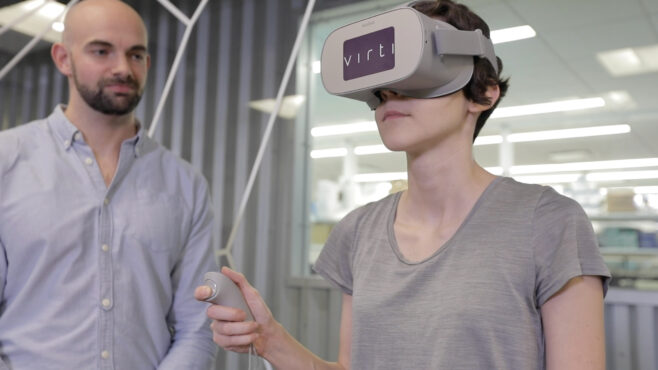As the pandemic took hold, training staff had to “go virtual.” Typically, that would have meant falling back on existing corporate training solutions, which we all know and “love.” Could there be another way?
In 2018, trauma surgeon Dr. Alex Young took the training required for high-stress scenarios like surgery and applied it to a virtual reality environment, ending up with, he says, a radical and effective approach to training.
His digital training platform Virti has now raised $10 million in a Series A round led by IQ Capital, which was joined by Cedars-Sinai Medical Center. In additional news, Kurt Kratchman and Mark Ashworth join Virti from Oracle as CRO and CFO/COO respectively.
Founded in Bristol, U.K., the Virti platform works across mobile or desktop devices, or VR/AR headsets and captures data across all three to analyze, measure and give feedback on employee performance, turning a lot of subjectively assessed skills into more objective and measurable data. It’s even managed to have been named one of TIME’s Best Inventions of 2020.
Virti claims its deep learning technology is improving training outcomes by up to 230% and the startups says it has increased revenues by 978%. It also has a cloud-based, no-code simulation creation suite allowing organizations to build their own bespoke training modules.
Dr. Alexander Young, CEO and founder of Virti, commented: “At Virti, our goal is to maximize human performance by making experiential learning affordable and accessible for everyone. In-person training has always been expensive with e-learning often unengaging — and research shows that employees forget upwards of 80% of episodic training.”
Max Bautin, managing partner at IQ Capital, said: “E-learning has seen strong growth over the last 5 years, and COVID-driven shift to remote work has increased demand many times over. Virti’s deep tech experiential learning platform is by far the best in the world.”
Virti competes with normal desktop-based training solutions. But on the VR side, more so with StriVR, which has raised $51 million, and Mursiun, which has raised $35.1 million.
Speaking to me over a call Young told me: “Our system, which we’ve patented in terms of the analytics, can actually track what people are looking at if they’re in a virtual reality headset. So we can really pull out some deep engagement metrics, a bit like heat map data you might see on marketing platforms. Combined with how people are interacting and doing things like making decisions in these environments, we can then predict how they may perform better in real-world environments and share that on a reporting dashboard. The other aspect is if you’re not practicing things you forget about 80% of what you can learn. Our system allows people to jump back in and reminds them and because it’s accessible on mobile as well as VR, AR headsets, they get that hit of updates and learning to keep them upskilled and remembering information for longer.”
